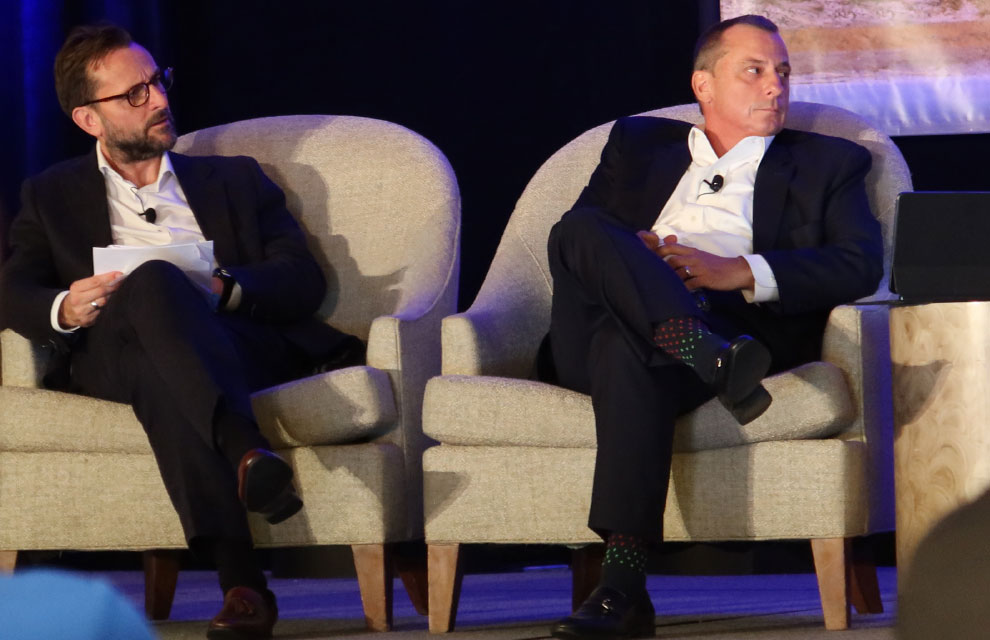RMA: Interoperability requires consensus as fears of fragmentation continue
13 October 2023 US
 Image: SFT
Image: SFT
Market participants fear that the move to increase interoperability could cause further fragmentation for the industry, according to the Risk Management Association’s (RMA’s) Cutting-Edge Technologies Part 1 panel.
As part of a double-session on technology at the 38th Securities Finance and Collateral Management Conference, Pirum Systems’ CEO Phil Morgan, EquiLend’s chief information officer Ken DeGiglio and Goldman Sachs’ head of EMEA digital assets Amar Amlani, provided a basic understanding of certain new technologies and their practical use cases.
Part 1 of the series also heard from BNY Mellon’s Victor O’Laughlen, head of digital for Clearance and Collateral Management (CCM), and J.P. Morgan’s Keerthi Moudgal, head of product for Onyx Digital Assets, who helped to explain key innovations such as tokenisation, digital assets, distributed ledger technology (DLT), smart contracts, artificial intelligence (AI), machine learning (ML) and robotic process automation (RPA).
Interoperability has become a buzzword in the industry, and the aim to become even more interoperable has presented a challenge, the panel heard.
Interoperability is defined by the Bank of International Settlements (BIS) as something that “refers to the ability to make something happen in one payment system based on something happening in another payment system”.
Panellists were questioned on whether the case for further interoperability was setting the industry up for another future issue.
Every country has its own payment rail — the infrastructure that moves money from one party to another — a panellist said. If firms create digital currencies, all on fragmented rails, firms will ‘end up with the same scenario’, in terms of further fragmentation, unless the industry ‘solves’ interoperability.
Panellists expect to see further use of interoperability in the future, with firms increasing their activity with regards to blockchain technology.
Interoperability is solvable, commented one panellist. However, interoperability requires consensus.
As part of a double-session on technology at the 38th Securities Finance and Collateral Management Conference, Pirum Systems’ CEO Phil Morgan, EquiLend’s chief information officer Ken DeGiglio and Goldman Sachs’ head of EMEA digital assets Amar Amlani, provided a basic understanding of certain new technologies and their practical use cases.
Part 1 of the series also heard from BNY Mellon’s Victor O’Laughlen, head of digital for Clearance and Collateral Management (CCM), and J.P. Morgan’s Keerthi Moudgal, head of product for Onyx Digital Assets, who helped to explain key innovations such as tokenisation, digital assets, distributed ledger technology (DLT), smart contracts, artificial intelligence (AI), machine learning (ML) and robotic process automation (RPA).
Interoperability has become a buzzword in the industry, and the aim to become even more interoperable has presented a challenge, the panel heard.
Interoperability is defined by the Bank of International Settlements (BIS) as something that “refers to the ability to make something happen in one payment system based on something happening in another payment system”.
Panellists were questioned on whether the case for further interoperability was setting the industry up for another future issue.
Every country has its own payment rail — the infrastructure that moves money from one party to another — a panellist said. If firms create digital currencies, all on fragmented rails, firms will ‘end up with the same scenario’, in terms of further fragmentation, unless the industry ‘solves’ interoperability.
Panellists expect to see further use of interoperability in the future, with firms increasing their activity with regards to blockchain technology.
Interoperability is solvable, commented one panellist. However, interoperability requires consensus.
NO FEE, NO RISK
100% ON RETURNS If you invest in only one securities finance news source this year, make sure it is your free subscription to Securities Finance Times
100% ON RETURNS If you invest in only one securities finance news source this year, make sure it is your free subscription to Securities Finance Times



